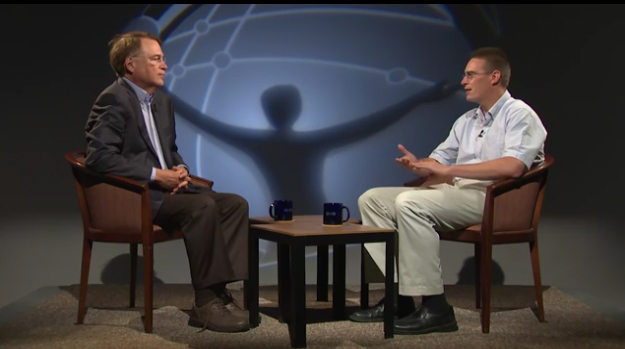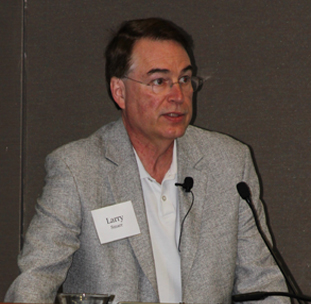Calit2 at UC San Diego and UC Irvine Welcomes National Microbiome Initiative
San Diego, May 13, 2016 — The White House Office of Science and Technology Policy (OSTP), in collaboration with public- and private-sector stakeholders, has rolled out a National Microbiome Initiative (NMI). Its goal: to foster the integrated study of microbiomes – the communities of microorganisms that live on and in people, plants, oceans and the atmosphere – and to develop tools to protect and restore healthy microbiome function.
The announcement follows a year-long, fact-finding study that produced three priority areas for microbiome science and more than $120 million in combined funding from federal agencies in fiscal 2016-’17:
- Supporting interdisciplinary research to answer fundamental questions about microbiomes in diverse ecosystems;
- Developing platform technologies that will generate insights and help share knowledge of microbiomes in diverse ecosystems and enhance access to microbiome data; and
- Expanding the microbiome workforce through citizen science, public engagement, and educational opportunities.

The OSTP estimates the total commitment to microbiome science efforts to be more than $400 million in financial and in-kind contributions, most notably with $100 million over four years pledged by the Bill and Melinda Gates Foundation to support microbiome research to reduce childhood malnutrition and soil microbiome research to improve crop protection, including in sub-Saharan Africa.
“This ambitious [National Microbiome Initiative] cannot be accomplished by individual laboratories working in isolation —developing advanced microbiome tools and treatments requires new collaborations among many disciplines,” said UC San Diego Chancellor Pradeep K. Khosla. “Advancing this relatively new field also depends on attracting and training multidisciplinary networks of scientists and engineers.”
Chancellor Khosla’s Microbiome and Microbial Sciences Initiative got underway in October 2015, co-led by Biological Sciences professor Kit Pogliano (who leads the student-centered Microbial Sciences Graduate Research Initiative), and Rob Knight, a professor of Pediatrics as well as Computer Science and Engineering. The centerpiece of the UC San Diego initiative was the creation of a Center for Microbiome Innovation (CMI), led by Knight. The center is investing $12 million “to enable technology developers to connect with end users,” and CMI includes approximately 150 faculty researchers with strengths in clinical medicine, computer science, bioengineering, data sciences as well as physical and biological sciences. Its mission is three-fold: to create standards for microbiome data; to undertake large-scale, crowdsourced microbiome research projects; and to foster collaboration across a network that spans thousands of investigators at other institutions.
Indeed, UC San Diego was a driving force behind the national initiative, following a 2013 scientific meeting in Washington, D.C. on the future of human microbiome science which Knight helped to organize prior to joining the UCSD faculty in January 2015 (from the University of Colorado at Boulder). Knight, Pogliano and Skaggs School of Pharmacy and Pharmaceutical Sciences professor Pieter Dorrestein were invited to the May 13 meeting where the White House announced the National Microbiome Initiative. “UC San Diego is fast becoming the go-to place to read out microbes – mapping which species live where and in what quantities – and understand what they are doing,” said Dorrestein, a leader in metabolomics and visualization.

As part of CSE's series Computing Primetime on UCSD-TV, Calit2's Larry Smarr and fellow CSE (and Pediatrics) professor Rob Knight of the Center for Microbiome Innovation discuss current research and how UC San Diego and Calit2 are well-positioned to apply high-performance computing and health trackers to the next frontier of microbiome research.
“Microbes pervade all kinds of processes — from our bodies to our planet to industrial fermentation and drug synthesis,” agreed Knight, who also directs the UC San Diego-based American Gut crowdsourcing project, which will expand its partnerships to improve understanding of the microbiome, as noted in the May 13 announcement. “Working closely with other researchers in the White House’s National Microbiome Initiative will help us unravel the fundamental science so we can understand how microbes do all these things, and help us improve the speed and accuracy in which we can ‘read out’ microbes.”
Both UC San Diego and UC Irvine will also participate in the microbiome initiative through their respective divisions of the California Institute for Telecommunications and Information Technology (Calit2), notably in efforts to develop platform technologies to enable novel approaches to answer fundamental questions about microbiomes that span ecosystems. “We have been engaged on both campuses with microbiome science for the past decade,” said Calit2 director Larry Smarr, who is also a professor of Computer Science and Engineering at UC San Diego and a member of CMI. “We are providing new platforms for the study of microbiomes, notably through our advances in scientific visualization and ultra-broadband networking through the Pacific Research Platform.” In launching the PRP in August 2015, the Calit2-led consortium confirmed that Smarr, Knight and colleagues from UC Davis, UCSF and Caltech would make use of the platform for Microbiome and Integrative ‘Omics research, part of a wider effort in Biomedical Data Analysis.
Smarr dates the genesis of Calit2’s research on microbiomes to January 2006 and a $24.5 million effort funded by the Gordon and Betty Moore Foundation. Called the Community Cyberinfrastructure for Advanced Marine Microbial Ecology Research and Analysis (CAMERA), the effort was led by Calit2’s Smarr in collaboration with the Scripps Institution of Oceanography UC San Diego alumnus Craig Venter and his J. Craig Venter Institute and the Scripps Institution of Oceanography. The project built a computational resource at UC San Diego to help scientists understand how microbes function in their natural ecosystems, a field called metagenomics.

Even before the seven-year CAMERA project ran its course, Smarr made a major commitment to understanding the practical – and personal – applications of microbiome science as part of his Future Health project. The effort began with Smarr’s decision to study his own microbiome and the role it plays in controlling or exacerbating his Crohn’s disease. Smarr also collaborates with Rob Knight, including on a multidisciplinary CMI project to sequence the gut microbiomes of people with inflammatory bowel disease (IBD), such as Crohn’s disease, affecting Smarr and millions of Americans.
Enabling this effort, Knight and his team developed Quantitative Insights into Microbial Ecology, or QIIME (pronounced chime), a microbiome analysis platform distributed through Illumina’s BaseSpace app store. Both the American Gut Project and the NIH-led Human Microbiome Project now rely heavily on the open-source QIIME software, as does Calit2’s Smarr. “We look forward to using QIIME on BaseSpace for our upcoming deep dive into the differences in the human gut microbiome in healthy people compared to people with inflammatory bowel disease,” Smarr said when the partnership with Illumina and BaseSpace was announced.
Each September for the past three years, the Calit2 division at UC Irvine has co-hosted annual workshops on Microbiome Connections jointly with the UCI Institute for Genomics and Bioinformatics and, since 2014, the university’s Data Science Initiative. At the first meeting in 2013 on Microbiome Connections to Disease and Health, Smarr presented on interactions of the immune system with the gut microbiome in IBD. Smarr was also on hand for the second symposium, which took place in 2014, organized by UCI professor Pierre Baldi. Then, at the third annual symposium in 2015, on Microbiome Connections to the Environment and Health, speakers included faculty members from UCI (Allon Hochbaum, Katherine Mackey, and Paolo Sassone-Corsi) and UC San Diego (Luke Thompson, a postdoc in Rob Knight’s lab, and clinical professor and gastroenterologist Amir Zarrinpar), as well as from Caltech, New York University and Stanford.
Media Contacts
Doug Ramsey, dramsey@ucsd.edu, (858) 822-5825
Related Links

